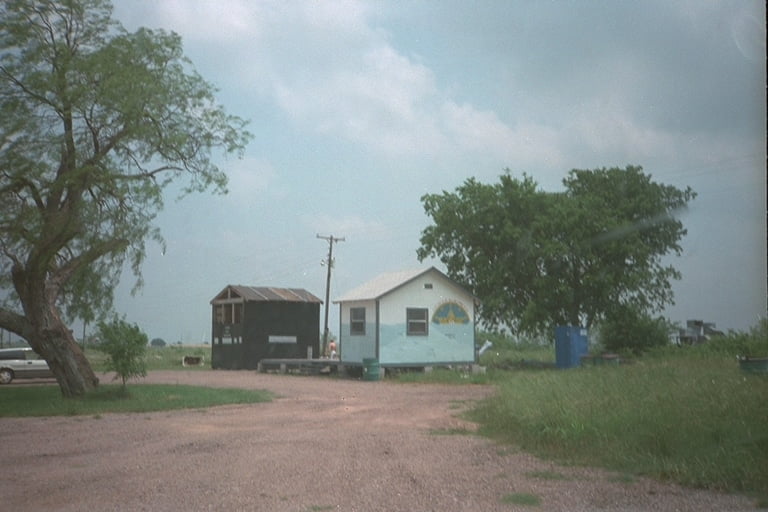The guy at the table was describing his situation growing up. “We were totally off the grid, pumping our own well water and everything. We were totally self-sufficient.”
As a suburbs kid, I couldn’t deny that I was impressed.
“All we needed to do is head into town once every week or two for some supplies.”
I asked, “how did you get there?”
“By car.”
Somehow, that didn’t seem so self-sufficient to me anymore.
Table of Contents
This land is my land
There is a particularly American desire to drop out of society and live on your own means. And this is true no matter if you’re a gubmit-hating, cattle-rustling cowboy or a chakra-wearing, turn-on-tune-in-drop-out hippie. When you think about it, the difference between a compound in Texas and a commune in Oregon is mainly a matter of home furnishing.
And at least in the circles I travel, there seems to be a focus on self-sufficiency. For example, the desire to be a farmer, to lessen our reliance on others. And make no mistake, thinking along these lines is a good thing. While I have no strong desire to grow my own food, I recognize that there is pleasure and value and benefit in doing so. 100% of my food is given to me by other people who grew it; am I abdicating some responsibility here?
And it feels good to take care of one’s own. No one wants to feel like a “mooch.” And yet, we need to realize that we are all moochers. Luckily, I don’t think this is a bad thing.
A society of moochers
If you want to drop out of society entirely, what would this mean? Where would you live and how would you acquire it? Saying that you can just take land that’s unoccupied seems a bit opportunistic to me. And how would you get there?
Back to the original story, the idea of self-sufficiency became a contradiction when the car got brought into the story. First of all, in order to own a car, one needs to interact with society in some way (assuming you care about the legality of what it takes to operate a car). Then you have to drive into town, which means that you are using shared property (roads).
The roads we drive on are infrastructure, a public service and are not free, regardless of whether there are tolls on them. We paid to pave them, and we all will have to pay to keep them in serviceable condition. So the claim that one is totally self-sufficient already seems to hold less water.
I heart society
I would like to propose an contrary view. I want us to recognize that we are all social animals and to subjugate this natural tendency is not healthy over the long term. We need others in order to thrive.
Few people maintain their off-the-grid existence as a purely solo act (assuming it’s even possible); usually there is a small group or a family. So where is the cutoff, and what is the difference? Why are those few people allowed in the inner circle, and not, say, the collective mass of people that we call “society”? Are people only okay when you personally know them? At what point does it not become about the “self” anymore?
The burden of air-conditioning
Chuck Klosterman, in his essay collection “Eating the Dinosaur,” recalls how simple desires lead almost immediately to inclusion in society. For example, his desire for air conditioning in summer:
“So—in order to have air conditioning—I will agree to live in a specific place with other people, following whatever rules happen to exist there, all while working at a job that was constructed by someone else for their benefit. In order to have a 70-degree living room, I give up almost everything.“
But I wonder, “what exactly is he giving up?”
Moreover, what is he getting in return? Not just air conditioning, but a full, rich society that provides economies of scale and wide tapestry of experiences. It allows him to be a full-time writer, something that would be much more difficult if he lived on a farm in North Dakota (which is where he grew up).
Now, we do have the capacity to take more ownership of our lives and our destinies, and so I think it would be better for us to take advantage of that opportunity. But not so much as to forget what we get by all living together. Which, don’t forget, we all do. And that is a good thing too.
But enough about me. Do you want to live off the grid? What does that mean to you?



2 Comments
Anya Trounce
For me self-sufficiency isn’t so much about being independent from others as it is about not buying into a society that funnels the power further and further upwards with every chocolate bar or pair of heels I buy. Having luxuries at the expense of others – everyone from sweatshop workers to underpaid service industry employees – is not how I want my world.
Mike @ Unlikely Radical
Hi Anya. Thanks, I like your style. I don’t know if having nice things is a zero-sum game, but it definitely benefits us all to question what it is that we really need.